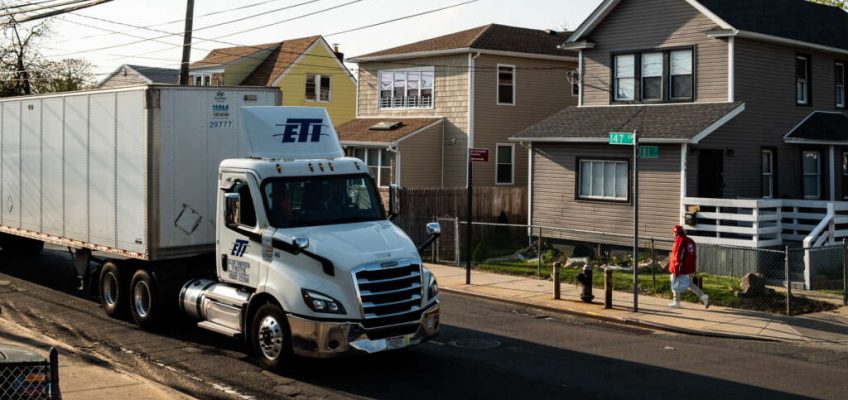“New York can forge ahead by adopting a Clean Fuel Standard (CFS). It’s a proven, market-driven strategy for rapidly decarbonizing transportation at minimal public expense.”
A truck traveling through Queens. (Adi Talwar/City Limits)
This week, Gov. Kathy Hochul announced a budget deal which allocates $1 billion for climate programs, details TBA. But the Legislature still has urgent work to do to implement New York’s landmark climate law and defend it from Trump administration attacks. To accelerate climate progress, it should pass a clean fuel policy this session.
The state’s climate law mandates a 40 percent greenhouse gas reduction by 2030, and 100 percent zero-emission electricity generation by 2040. We’re not on track to meet those goals. Recently, the U.S. Environmental Protection Agency denounced the law as unimplementable, even as the U.S. Department of the Interior revoked the permit for a large windpower project off Long Island that would have helped implement it.
But New York can forge ahead by adopting a Clean Fuel Standard (CFS). It’s a proven, market-driven strategy for rapidly decarbonizing transportation at minimal public expense.
CFS policies incentivize low-carbon fuels and electricity for transportation, including renewable diesel and renewable natural gas made from organic wastes. They work by making polluters, not taxpayers, pay for cleaner alternatives, requiring high-carbon fuel producers to buy credits from low-carbon fuel producers. As carbon emissions targets tighten year on year, production of clean fuels generating the most credits ratchet up.
These programs really work. Since California adopted the first Low Carbon Fuel Standard in 2011, clean fuels replaced over 31 billion gallons of liquid petroleum fuel in-state, reducing the California transportation sector’s carbon intensity by over 15 percent three years ahead of schedule, and that progress is accelerating. Similar standards were adopted in Oregon, Washington State, New Mexico, and Canada.
Eleven other U.S. states are considering them, including New York, which is undertaking a CFS feasibility study. But the jury is already in: CFS works. Decarbonizing transportation is urgent, and the Legislature should enact CFS.
New York’s transportation sector is its second largest greenhouse gas emitter and a major source of toxic air pollution. Diesel truck exhaust contributes to smog and acid rain, harms health, and kills 3,000 New Yorkers annually. By far the worst offenders are thousands of heavy-duty diesel trucks built before 2013 still on our roads. A CFS would enable replacing them with cleaner fuel trucks.
An Energy Vision report recently assessed three replacement technologies: trucks running on renewable diesel made from vegetable oils; compressed natural gas trucks running on RNG made from organic wastes; and heavy-duty electric vehicles.
It found that while EVs work well as light- and medium-duty trucks up to 26,000 pounds, they aren’t yet a practical replacement for heavier trucks (Class 7 and 8). Heavy-duty EV trucks cost $250,000 more than diesels. Their large, heavy batteries shrink cargo capacity.
They have limited range, performance issues, longer downtime, and scant availability (fewer than 1,800 were deployed nationwide from 2017 to mid-2024). Although their tailpipe emissions are zero, their overall emissions are not. In NYS, fossil fuels still generate about half the electricity charging their batteries. And heavy-duty EVs require costly high-capacity charging stations, which have yet to be built here.
Following California’s lead, New York instituted an Advanced Clean Trucks rule requiring truck manufacturers to sell an increasing percentage of zero-emissions vehicles starting this year, rising to 100 percent by 2045. The quota system favors EV trucks.
But given concerns about their cost, performance and charging infrastructure, it’s difficult to see how the rule could realistically be applied to the heaviest EV trucks. NYS Senator Jeremy Cooney introduced a sensible bill to delay the rule’s implementation. “I remain fully committed to New York’s climate goals,” he said. “I also recognize the work needed to put infrastructure in place supporting EV trucking.”
Meanwhile, we can’t wait to start replacing New York’s oldest, dirtiest heavy trucks. There are viable alternatives we can deploy now.
There are already 90,000 heavy-duty compressed natural gas trucks on U.S. roads fueled increasingly by renewable natural gas. RNG-powered trucks have 88 percent of the clean air benefits of heavy-duty EVs, much lower costs, and potentially greater climate benefits. Producing RNG captures methane that would otherwise escape into the atmosphere and warm the planet. When made from manure or food waste, RNG has the lowest lifecycle GHGs of any fuel or battery system.
A New York CFS would speed adoption of RNG fuel and trucks here. It would simultaneously generate funds for EV charging infrastructure, hastening implementation of the Advanced Clean Trucks rule. The two policies are complementary.
With New York’s climate targets looming, we need to make rapid progress on cleaning up our transportation sector. More charging stations will help eventually, but as NYS Senator Brad Hoylman-Sigal said, “We cannot wait any longer to implement a clean fuel policy in New York State.”
The Legislature should do it this session, and not punt to next year.
Matt Tomich is President of the non-profit organization Energy Vision.
The post Opinion: To Accelerate NY’s Climate Progress, Pass a Clean Fuel Policy appeared first on City Limits.


Leave a Reply